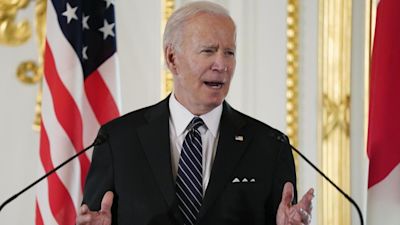Joe Biden pledges to defend Taiwan militarily if China launches an invasion

ITV News Asia Correspondent Debi Edward reports on Biden appearing to torpedo a foreign policy designed to be deliberately vague about US military intension in Taiwan
Joe Biden has said the US would intervene militarily to defend Taiwan if it came under attack from China, as he warned that Beijing is "flirting with danger" over its positioning towards its democratic neighbour.
"That's the commitment we made," the US president told reporters at a press conference in Tokyo on Monday.
Speaking alongside Japanese Prime Minister Fumio Kishida, Mr Biden said any effort by China to use force against Taiwan would “just not be appropriate,” adding that it “will dislocate the entire region and be another action similar to what happened in Ukraine”.
"They’re already flirting with danger right now by flying so close and all the maneuvers that are undertaken,” the US president, referencing China, added.
He is on his first tour of Asia as US president, visiting regional allies, including members of the so-called Quad, which include Australia, Japan, America and India.
His comments come against the backdrop of growing concern over Chinese military activity in the region, as the Chinese Navy has been conducting drills in the south China sea.
Last week, the Maritime Safety Administration office in the southern Chinese island province of Hainan said Chinese military drills began on Thursday and will continue through until Monday.
ITV News Correspondent Robert Moore on the difficulty in discerning whether this was a Biden blunder that provokes China and destabilises the region or whether he was trying to recalibrate American policy
China, which has an estimated population of 1.4 billion, claims its self-ruled democratic neighbour Taiwan as its own territory, and has vowed to take it back, with force if necessary. The US traditionally has avoided making explicit security guarantees to Taiwan, with which Washington has no official diplomatic ties to.
This is because, in accordance with Beijing's 'one-China principle', the US acknowledges China's position that there is only one Chinese government.
However, the US maintains unofficial contacts, including a de facto embassy in Taipei, the capital, and supplies military equipment for the island’s defence.
Mr Biden's comments to journalists appeared to contradict the long-standing commitment to the policy in the region - although the White House has dismissed claims of any such departure.
They were the second comments in recent months in which the president has unequivocally stated the US would defend Taiwan if China attacked.
The latest remarks drew an angry rebuke from the mainland, with Chinese Foreign Ministry spokesperson Wang Wenbin expressing “strong dissatisfaction and resolute opposition” to the US president's comments.
“China has no room for compromise or concessions on issues involving China’s core interests such as sovereignty and territorial integrity,” he said.
“China will take firm action to safeguard its sovereignty and security interests, and we will do what we say.”
Want a quick and expert briefing on the biggest news stories? Listen to our latest podcasts to find out What You Need To Know
Meanwhile, officials in Taipei welcomed Mr Biden’s remarks, with Ministry of Foreign Affairs spokesperson Joanne Ou expressing “sincere welcome and gratitude” for the comments. “The challenge posed by China to the security of the Taiwan Strait has drawn great concern in the international community,” said Ms Ou.
“Taiwan will continue to improve its self-defence capabilities, and deepen cooperation with the United States and Japan and other like-minded countries to jointly defend the security of the Taiwan Strait and the rules-based international order, while promoting peace, stability and prosperity in the Indo-Pacific region.”